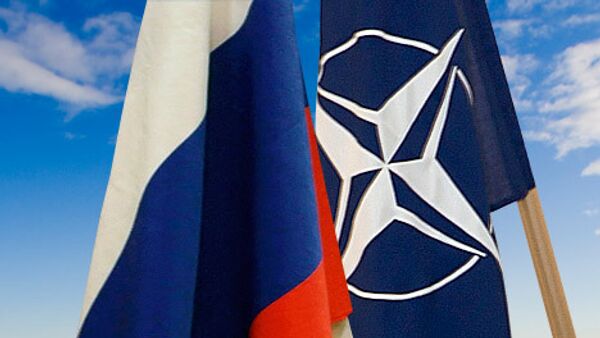MOSCOW. (RIA Novosti political commentator Andrei Fedyashin) - NATO-Russia relations, surface-frozen after last August's conflict in the Caucasus, were put into a microwave on April 28 when the NATO-Russia Council (NRC) held in Brussels a meeting at ambassadorial level for the first time since the war in South Ossetia.
The ambassadors are working on the agenda of the NRC ministerial meeting, scheduled for May 19. This meeting is expected to become an arena where the big thaw can take place. At least, both sides are talking about it. However, the question is how they are going to melt the ice, or what are they hoping will thaw?
Before the April 28 meeting, our envoy to NATO Dmitry Rogozin promised to give the alliance a hard time for the planned military exercises in Georgia - and he duly kept his promise. By and large, these exercises are harmless, but NATO plays dirty by conducting them with the aggressor, thereby encouraging Tbilisi to new hideous acts and consolidating its shaky reputation.
In general, all that is melting (or prepares to melt) in Brussels is a very odd substance. A closer look at it makes it incomprehensible whether this substance is "frozen," "dried up," or "ossified."
The NRC was set up on May 28, 2002 at the NATO-Russia summit in Rome. Its official website reads, in part: "In accordance with the Rome declaration, NATO member states and Russia work as equal partners in areas of common interest in the framework of the NRC, which provides a mechanism for consultation consensus building, cooperation, joint decision and joint action on a wide spectrum of security issues in the Euro-Atlantic region." This seems to be a serious statement.
However, the problem is that since its establishment, the NRC has not made any serious contribution to destroying Cold War stereotypes. It has not made a single general assessment of threats and ways of countering them. Assessments of terrorism by the NRC are out of place here - the council is not required to do this.
Cooperation was scanty even before the conflict in the Caucasus. Its freezing after last August did not change anything.
They say that NATO needs Russia more than the other way round. Did Russia ever need NATO? NATO needs Russia as a road to Afghanistan, but we have already agreed, regardless of NATO, to let the United States and its allies use our territory as a corridor for the delivery of non-lethal cargoes to Afghanistan.
The NRC has done absolutely nothing in line with its official designation either before or after the war in South Ossetia. The role of the mediators was played by the European Union (EU), and French President Nicolas Sarkozy.
I'd like not to get personal but I cannot help it. The more I analyze such meetings and our bold demarches at them, the less I understand. Sometimes, I become totally confused.
It is very difficult to understand how we can criticize NATO for being an anachronism (which is in fact correct), for exaggerating its powers (the Kosovo mission), or for trying to misappropriate part of the functions of the UN and the OSCE, and at the same time talk about the need to consolidate and upgrade cooperation with it. As popular film character Stirlitz used to say "This story does not hand together." Either NATO is not an anachronism, that is, we secretly believe in it, or our cooperation is false.
Everything is confusing, even statements by our Foreign Minister Sergei Lavrov, a man whom I deeply respect. I fail to understand what he meant in Luxembourg on April 27 when after the meeting of the EU-Russia Permanent Partnership Council, he said that at the forthcoming NRC ministerial meeting he was hoping to convince the alliance that each of its members should present ITS OWN POSITION RATHER THAN NATO'S POSITION IN GENERAL: "The principles underlying the performance of the NRC are more progressive than our dialogue with the EU, as the NRC has agreed in writing that each member [of NATO] represents its own country rather than NATO as an alliance... We will discuss this as well when, I hope, the NRC will resume its work at foreign minister level in May."
Why do we need the NRC if we can deal with each NRC member independently? Are NATO members aware of this?
I'm just beginning to see the light when looking at Rogozin and NATO's collective portrait.
Maybe this is a secret manifestation of our real attitude to the alliance and cooperation with it?
Personally, I don't have anything against Mr Rogozin. I even like him for his open and straightforward attitude, although sometimes he goes too far. But when I listen to his statements, I cannot help getting rid of one politically harmful idea, notably that he was sent to NATO based on the principle: "Let's send Dima. Let him teach them what's what. He can do that." I'm even curious if I'm the only one in the wrong or do many people think the same way?
Outwardly, the NRC looks quite decent - talks are going on, and cooperation on something somewhere continues. But a closer look at it reveals some odd things. I again went on the NRC website to convince myself that I'm wrong, and then I got totally upset. How can one understand this? Important issues of military cooperation, which were discussed by the NRC before, include the following subjects:
NRC Ad Hoc Working Group on Logistics Workshop on "POL Interoperability";
"The Nexus between Organized Crime and Terrorism";
NRC Working Group on Defense Reform and Cooperation Seminar on "Procurement, Contracting and Financial Planning";
"Overseas Hostage Taking by Terrorist Groups"
"Development of SMEs by former military."
Is this what the NRC was required for? Has it discussed all these issues? Will it address these matters again?
The opinions expressed in this article are the author's and do not necessarily represent those of RIA Novosti.



